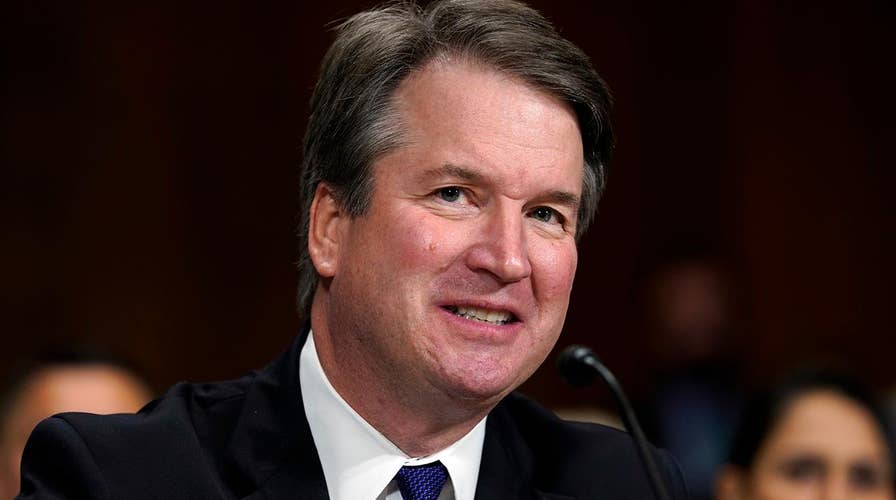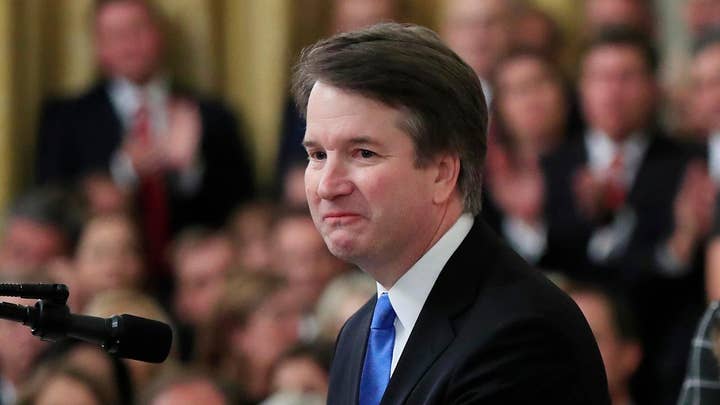After failing to block the confirmation of Justice Brett Kavanaugh to the Supreme Court, Democrats and allies in the media are shifting course to float a range of ideas -- some far-fetched -- to curb the rightward shift of the court.
They range from packing the bench with more justices to overhauling the Constitution itself. Here's a look at some of the strategies that have taken off in the opinion pages, social media-sphere and cable talk circuit.
Packing the Court
President Franklin Delano Roosevelt once famously threatened to expand the Supreme Court to as many as 15 justices after the court ruled against a number of his New Deal measures. The plan was shut down in the Senate, but it gave the plan a whiff of legitimacy and is frequently cited by liberals whenever the court leans to the right.
One of the voices leading the charge in the wake of Kavanaugh’s confirmation is Washington Post columnist E.J. Dionne, who advised there “should be no squeamishness” about packing the court if Democrats gain the power to do so after the 2020 election.
“The current majority on the court was created through illegitimate means,” he wrote. “Changing that majority would not constitute politicizing the court because conservatives have already done this without apology.”
Michael Avenatti, attorney for Stormy Daniels and Kavanaugh accuser Julie Swetnick, has also backed the scheme -- saying that “any Dem that does not commit to expanding the Court has no business running for the nomination.”
No major Democratic lawmakers, while accusing President Trump of undermining America’s institutions, have yet come out in favor of the scheme.
Impeachment
Impeachment against a sitting president is rare -- but even rarer against a Supreme Court justice, having been pursued only once in American history. But in the wake of a hyperpartisan confirmation process, some Democrats have floated the idea for Kavanaugh.
Sen. Cory Booker, D-N.J., said the option of impeaching Kavanaugh should not be ruled out and said he would support further investigation into the newest justice.
“If there is conclusory evidence that shows unequivocally that he lied to a Senate committee, that is a crime and he should be held accountable for those criminal acts,” Booker told Yahoo News on Sunday in Iowa, suggesting a probe into whether Kavanaugh perjured himself before the Senate.
DEMS WAGE WAR ON KAVANAUGH, COURT: NEW BATTLES OVER LEGITIMACY, IMPEACHMENT, RECUSAL
He said, though, that Democrats first need to focus on taking back the Senate majority.
“I think that after the dust settles on the night of [November] 6, I think that’s where we start to evaluate … what is the best thing for us to be focusing on in terms of what’s best for America and the American people,” Booker said.
Rep. Jerrold Nadler, D-N.Y., said over the weekend that if the Democrats take back the majority in the House, they will launch a separate investigation into Kavanaugh’s potential perjury and alleged sexual assault.
“It is not something we are eager to do,” Nadler told The New York Times Friday. “But the Senate having failed to do its proper constitutionally mandated job of advise and consent, we are going to have to do something to provide a check and balance, to protect the rule of law and to protect the legitimacy of one of our most important institutions.”
He added: “We have to assure the American people either that it was a fair process and that the new justice did not commit perjury, did not do these terrible things, or reveal that we just don’t know because the investigation was a whitewash.”
Constitutional Overhaul
The popular vote is like “yards gained” in NFL games -- an interesting statistic, and a possible consolation for a losing team, but it’s not what wins games. In the NFL, it’s points scored that win games, and in U.S. elections, it's the Electoral College that decides elections.
Yet one of Hillary Clinton’s key talking points in the wake of her 2016 defeat was that she won the popular vote -- which was quickly used by supporters and allies to suggest that Trump’s election was illegitimate. That argument is now being stretched to include his Supreme Court nominees.
A Washington Post analysis, while not explicitly questioning Kavanaugh’s legitimacy, declared that Kavanaugh had the “distinct” honor of being nominated by someone who lost the popular vote and was confirmed by senators “representing less than half of the country.
“Kavanaugh will join the Supreme Court despite opposition from senators representing more than half the country, despite more than half the country opposing his nomination, despite being viewed unfavorably by nearly half the country and thanks to a president who is viewed with disapproval by more than half the country and who lost the popular vote,” the analysis said.
Author Philip Bump later issued an addendum noting, in response to readers, that he is aware that America is a republic and how the Senate and Electoral College work. “It is worth noting, though, that this structure can at times conflict with the precept that all men are created equal,” he wrote.
Newsweek, meanwhile, noted Kavanaugh is the “fourth Supreme Court justice nominated by [a] president who didn’t win the popular vote” -- referring to Kavanaugh and Neil Gorsuch under Trump, and John Roberts and Samuel Alito, under former President George W. Bush.
While neither the Post nor Newsweek called for direct changes to the current structure under the Constitution, others did. Ken Dilanian, an intelligence and national security reporter for NBC News declared that “the idea that North Dakota and New York get the same representation in the Senate has to change.”
Then Democratic socialist House candidate Alexandria Ocasio-Cortez went for the Electoral College. She tweeted it was “well past time we eliminate the Electoral College, a shadow of slavery’s power on America today that undermines our nation as a democratic republic.”
Clinton, meanwhile, has not applied her calls to abolish that system directly to Kavanaugh but has kept up her talking point. In September, amid the Kavanaugh fight, she said “I think it needs to be eliminated.”
“I’d like to see us move beyond it, yes,” she told CNN.
Term Limits on SCOTUS Justices
The New Republic argued that the Constitution does not enshrine lifetime tenure for Supreme Court justices, “at least not overtly.” The article noted that Article III of the Constitution allows judges to “hold their offices during good behavior.”
While author Lawrence Goldstone did not challenge Kavanaugh’s legitimacy, he argued that he is the latest in a series of appointments where age has been a key factor. He argued that establishing term limits would “return a degree of civility to a process that has careened hopelessly out of control, but we could once again begin to choose members of the nation’s highest and most powerful court on the basis of their achievements, rather than just their longevity.”
A twist on the “good behavior” argument was applied by Sen. Ed Markey, D-Mass., who noted the article and said that “what this body has been unwilling to do is actually determine whether or not Judge Kavanaugh has engaged in good behavior before he is put on the court.”
Enforcing the McConnell Rule
This is perhaps the most realistic of all the options available to Democrats. The debate centers on Senate Majority Leader Mitch McConnell’s decision not to hold hearings in 2016 for then-President Barack Obama’s Supreme Court nominee Merrick Garland to replace the late Justice Antonin Scalia.
McConnell said that since it was an election year, the nomination should hold until after the 2016 election. President Trump then won that election and nominated now-Justice Gorsuch. McConnell said he was enforcing a long-held tradition of not confirming a justice in an election year, and cited 1992 remarks by then-Democratic Sen. Joe Biden who supported such a claim -- leading to Republicans calling it the “Biden rule.”
Democrats accused Republicans of “stealing” a Supreme Court seat, and Garland’s name came up multiple times in both Gorsuch’s and Kavanaugh’s hearings.
It raises the possibility that a seat could come available in 2020, and Democrats could then demand that McConnell hold the seat open until after the election. McConnell, though, maintains that the 2016 principle only applied because the White House and Senate were held by different parties.
Such a position would certainly face fierce opposition from Democrats, but also some Republicans. Both Senate Judiciary Chairman Chuck Grassley, R-Iowa, and Sen. Lindsey Graham, R-S.C., have said they would not support a Supreme Court confirmation in 2020.
Fox News’ Brooke Singman contributed to this report.





